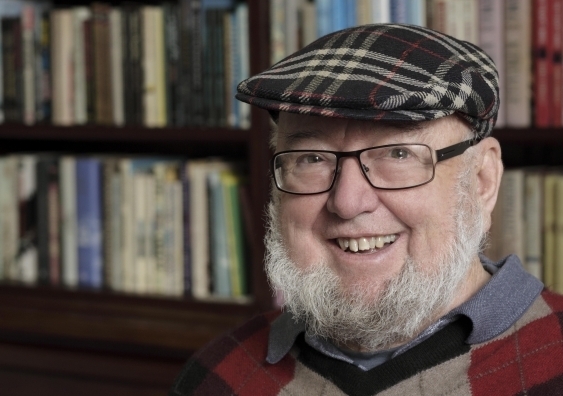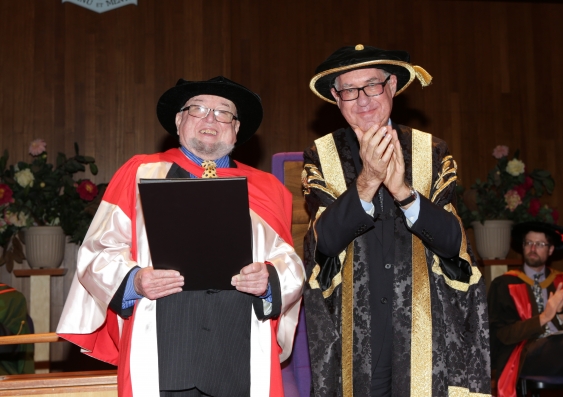Honorary doctorate for ‘Australian living treasure’
Internationally renowned Australian author Thomas Keneally has been awarded a UNSW Doctor of Letters honoris causa for his contributions to Australian literature.
Internationally renowned Australian author Thomas Keneally has been awarded a UNSW Doctor of Letters honoris causa for his contributions to Australian literature.

Myles Gough
02 9385 1370
myles.gough@unsw.edu.au
The internationally renowned Australian author and historian Thomas Keneally has been awarded an honorary doctorate in recognition of his contributions to Australian literature and society.
Noting his illustrious career as “a supreme teller of stories” that have had a profound impact on our understanding of the past, UNSW conferred on Keneally the degree of Doctor of Letters honoris causa, the University’s highest honour.

Doctor of Letters ... Tom Keneally with the Chancellor, David Gonski
Keneally is the author of more than 40 published works of fiction and history, and has won an array of literary prizes and honours in Australia and around the world.
He has three times been nominated for the Man Booker Prize for the best work of fiction published in English, winning in 1982 for his novel Schindler’s Ark, which was later adapted into the Academy Award-winning film Schindler's List.
Keneally, who grew up in New South Wales, is also an avid public speaker and activist. He has recently edited a pair of anthologies focused on the asylum seeker debate: Another Country, is a collection of writings by asylum seekers, while A Country Too Far, features essays and stories by some of Australia’s leading writers.
In his speech at the UNSW graduation ceremony, Keneally spoke about the issue, urging both major political parties to stop their “outrageous and wilful" misuse of the English language to dehumanise refugees, and instead commit to finding an international solution.
“We have reacted to a genuine world crisis with verbal meanness and subsequent cruelty,” he said. “I wish devoutly that instead of pressing the English language into its more brutal gears and scapegoating victims… we too could address ourselves not to international denial but to an international solution.”
“Let us lead a world crusade to enable, through the co-operation of all liberal democracies, accredited refugees to be absorbed into our populations,” he said.
“So let's use mandatory detention only for health, identity and security checks that do not take years, but weeks. Let's have accommodation centres – not prisons. And for God's own sweet sake, let's release all children from mandatory detention. Let's have an independent commission to decide on asylum seeker policy to stop politicians using it to improve their vote.”
Keneally has had a long-standing relationship with UNSW. In January 2014, he delivered the university's annual Gandhi Oration, and before that played an important role in the campaign to establish a Chair of Irish Studies.
In 1983 he was made an Officer of the Order of Australia. He is also a Fellow of the Australian Academy of the Humanities, was the founding chairman of the Australian Republican Movement, and has served on the Australian Constitutional Commission and the Australia-China Council.
Read an extract of Keneally's speech here.